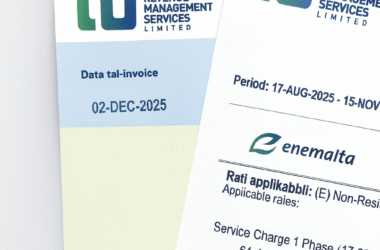The Malta Budget 2025 introduces initiatives with a focus on economic growth, tax benefits, sustainability, and support for businesses. Here’s a closer look at the key areas addressed in this year’s budget:
Economic Outlook
GDP Growth: Malta’s GDP is expected to grow by 4.2% in 2025, supported by steady exports and policies to stabilize energy prices. Although inflation may slightly impact spending, Malta is projected to lead EU growth, continuing strong momentum from 2024.
Inflation: Malta’s inflation rate is forecast to ease to a stable 3.1% in 2025, supported by government measures to keep energy prices steady. This gradual decrease reflects Malta’s ongoing efforts to create a balanced and resilient economic environment, which should positively impact the cost of living while supporting steady growth.
Employment: Malta’s employment rate is approximately 77.8% for individuals aged 15 to 64.
Interest Rates: Projected interest rates in Malta for 2025 are expected to be around 2.90%. This follows a slight decrease from 3.40% in 2024, indicating a gradual easing in monetary policy as inflation trends are expected to decline.
Deficit Reduction: In 2025, Malta’s government deficit is projected to decrease to 3.9% of GDP, down from 4.3% in 2024. This improvement is primarily due to a reduction in expenditures related to energy price support measures
Global Trade: In 2025, Malta’s global trade is expected to see exports of goods and services grow by about 2.9%, while imports will rise by approximately 2.1%. This growth reflects Malta’s strategic trading position, particularly with Europe and Asia.
Debt to GDP: Malta’s projected debt-to-GDP ratio for 2025 is 52.6%, well below the EU threshold of 60%. This indicates Malta’s strong fiscal management and commitment to maintaining sustainable public finances.
In 2025, Malta’s economy is projected to grow by 4.3%, continuing its trend as the EU’s fastest-growing economy. Job growth is also expected to remain strong, with a rate of 4.1%. Inflation is anticipated to drop to 2%, aligning with the European Central Bank’s target.
The budget reflects a reduced deficit, estimated at €904 million (4% of GDP), while public debt is expected to reach 50.1% of GDP
This strategic approach highlights Malta’s commitment to economic stability and growth despite global challenges.
For more insights, you may refer to the European Commission’s reports on Malta’s economic outlook.
Income Tax Benefits for Families
- School Fees Deduction: The allowable tax deduction for registered school fees has been increased, effective 2025, to €3,500 for kindergarten, €4,600 for primary, and €6,500 for secondary school per child.
- Tax Band Revisions: Updates to individual tax bands will extend the 0%, 15%, and 25% tax rates, potentially easing income tax burdens for various household types.
- Pension Income Exemption: From 2025, 80% of pension income for individuals aged 61+ and still working will be tax-free.
- Tax Credits for Occupational Pensions: Employers must now offer new employees access to voluntary occupational pension plans. Both employers and employees can receive a 25% tax credit on contributions, capped at €750.
Tax Relief and Credits
- In-Work Benefit: Net income for In-Work Benefits will now exclude tax payments, potentially increasing eligibility.
- Parents of Disabled Children: Parents will see their tax credit increase from €500 to €750, with eligibility extending to unemployed parents and social benefit recipients.
- Donations: Companies donating to social, environmental, and animal welfare causes may claim a tax credit of up to €500.
Property and Transfer Benefits
- Tax and Duty Relief: Extended relief on property transfers includes tax and duty exemptions on the first €750,000 of properties vacant for seven years or located in Urban Conservation Areas. First-time buyers of these properties may receive grants of €15,000 (Malta) or €40,000 (Gozo).
- Duty Exemptions for First and Second-Time Buyers: Relief schemes for duty on first and second properties are extended, including a €10,000 grant for first-time buyers and duty refunds on second properties within a 12-month transfer period.
Value Added Tax (VAT)
- VAT Refunds: Extensions include refunds for restoration costs on old or vacant properties and VAT exemptions on sanitary products.
- Bicycle VAT Refunds: Refunds continue for bicycles and electric bikes, promoting sustainable transport.
Environmental and Renewable Energy Incentives
- Carbon-Free Initiatives: Households investing in renewable energy and water conservation solutions can continue to benefit from government incentives.
- Electric Vehicle Grants: For electric vehicle purchases, buyers can receive grants from €2,000 for motorcycles to €8,000 for cars. Additional grants apply to vehicles registered in Gozo, and current orders placed by 28 October 2024 remain eligible for benefits.
Economic and Business Support
- Vision Malta 2050: Malta is launching Vision Malta 2050 to address climate change, tech innovation, and demographic shifts.
- Innovation Hub and Start-Up Funding: The European Digital Innovation Hub will provide local start-ups and SMEs with mentorship and funding access. A €10 million venture capital fund will also boost new companies.
Additional Reforms and Guidelines
- Transfer Pricing and IFRS 17: Guidelines on transfer pricing and the taxation of insurance businesses under IFRS 17 are now in place to assist businesses and ensure compliance with OECD standards.







